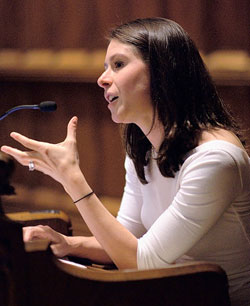Sound Policy
TC's inaugural Policy Fellows Forum, held in early May in Milbank Chapel, took its audience from rural Ethiopia to the interior of a prison in upstate New York, to Boston public schools, to private homes providing preschool care-'"the full range of research and dissertation topics covered by the College's first "class" of nine Policy Fellows during the year since their fellowships were granted. |
The Fellows were chosen "for work that will contribute to policy debates at the local, regional, state, federal and/or international levels, and help advance educational and social policy," says Associate Dean Sharon Lynn Kagan, Director of the Teachers College Office of Policy Research (OPR), which sponsored the group of Fellows when the program was announced in May 2005 (to read more about the program's launch, go to: www.tc.edu/news/article.htm?id=5141). Kagan says there are 24 incoming fellows, including research as well as policy fellows.
Since its inception, TC has been at the forefront of American institutions in influencing educational research and policy, Kagan notes. "Our effort in establishing the Office of Policy Research is to sustain TC's abundant contributions to educational advancement through premier research and policy work," she says. Led by TC Professor Amy Stuart Wells, OPR has put together a compendium of policy courses available at TC, and has developed an internship plan.
Kagan then introduced the outgoing Fellows. They were:
Jennifer Swift-Morgan, a student at the Department of International and Transcultural Studies, who spoke about her interest in how education policies are formed in developing countries, and what "community participation" really means. Among the research questions Swift-Morgan sought to explore: "How do people that policies affect become more involved in policy?" To find answers, she conducted more than 200 interviews in rural
Melinda Mechur Karp, who discussed her research on the practice of dual enrollment, in which high school students take actual college courses (as distinct from Advanced Placement courses). In a study of the College Now dual enrollment program, in which 17 CUNY schools participate), Karp found that, over time, an "anticipatory socialization" took effect, as most of the high school students involved eventually came to see themselves as college students. "If your identity incorporates that of a college student, you may be more inclined to stick it out to graduation," said Karp.
Jed Tucker, who spent two years teaching prison inmates at a correctional facility in
Saeyun D. Lee, a doctoral student in Organization and Leadership, whose research, conducted at the Boston Public Schools district, looked at the capacity of schools to implement reform. That ability, Lee found, hinges both on institutions' will to change (at the organizational and individual levels) and their capacity to change--that is, their resources (money, people and support within existing structures) to make change happen.
Kate Tarrant, a first-year doctoral student in Curriculum and Teaching and a graduate fellow at the National Center for Children and Families, who discussed the application of school-readiness policy to home care settings. Home-based care is the predominant form of early care and education (ECE) in the
Michelle Van Noy, a doctoral student in Human Development, who is a senior research assistant at TC's
Manu Kapor, a doctoral student in Mathematics, Science and Technology, who is researching the mechanics of problem solving. Kapor is comparing two groups of learners: well-structured groups that have a "scaffold" of support; and ill-structured, un-scaffolded groups. He wants to examine how "productive failure" can help educators learn how to construct better problem-solving exercises and lessons, with policy implications for curriculum design.
Published Monday, Sep. 18, 2006
